User Portal Overview
The WP Engine User Portal is your central hub for managing your WP Engine plan, features, and sites. You can find SFTP login details, access your database, create new sites and environments, view your account usage and billing, and much more from the User Portal.
The WP Engine User Portal can be accessed by opening the following URL in your browser: https://my.wpengine.com
Dashboard
The Dashboard page is accessible by clicking Dashboard in the main menu, or at the following link: https://my.wpengine.com/dashboard
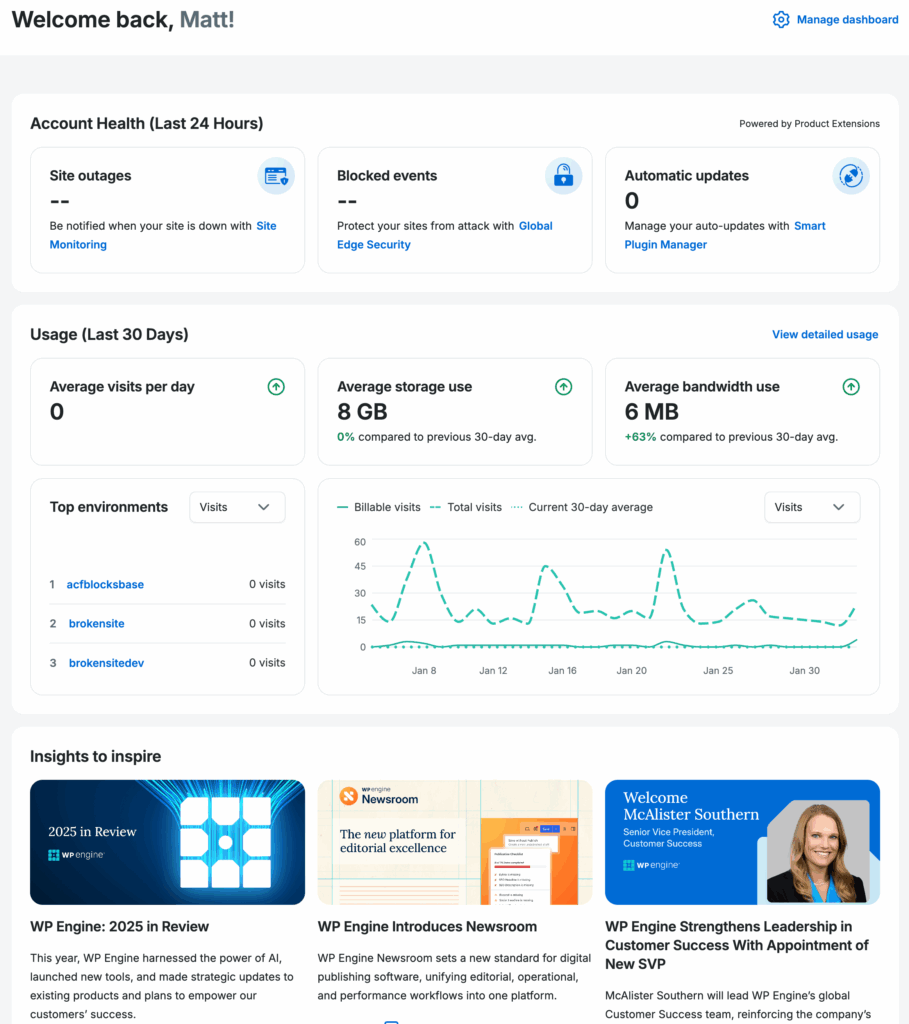
Set the Dashboard as your default landing page when accessing the WP Engine User Portal by visiting Profile icon > Profile & Settings > Settings > Default homepage.
NOTE
At this time only Owners and Full users (with or without billing) can view this page.
The Dashboard page contains information such as:
- Updates – Can be further filtered by environment type. Data is refreshed every 24 hours.
- Plugin updates
- Theme updates
- PHP version
- WordPress® core version1
- Plan Overview – Displayed for the current billing cycle.
- Site used
- Storage utilization
- Bandwidth usage
- Billable visits
- Account Health (24 hours) – Data provided by specific WP Engine product extensions.
- Site outages (Site Monitoring)
- Blocked events (Global Edge Security)
- Automatic updates (Smart Plugin Manager)
- Usage (30 days) – Averages across the past 30 days, and top 3 environments. Can be toggled to view by Billable Visits, Storage, and Bandwidth.
- Lighthouse Performance – Ranked by lowest or highest score, for both mobile and desktop.
- Top Searches – Top search results across all production environments when using the Smart Search product extension.
- Recent Account Activity – Recent user activity in the WP Engine User Portal.
- News and Events
- Insights to Inspire
- Account Notifications
- Billing Overview
- WP Engine Site Performance Scores
Customize the Dashboard
The dashboard can now be customized for each user and account with a drag and drop interface to add, remove, and move widgets.
To customize the dashboard:
- Go to the Dashboard page and use the account switcher at the top of the left sidebar to select an account that you want to customize.
- On the dashboard page click the Manage dashboard button in the top right.
- Click the Customize layout button.
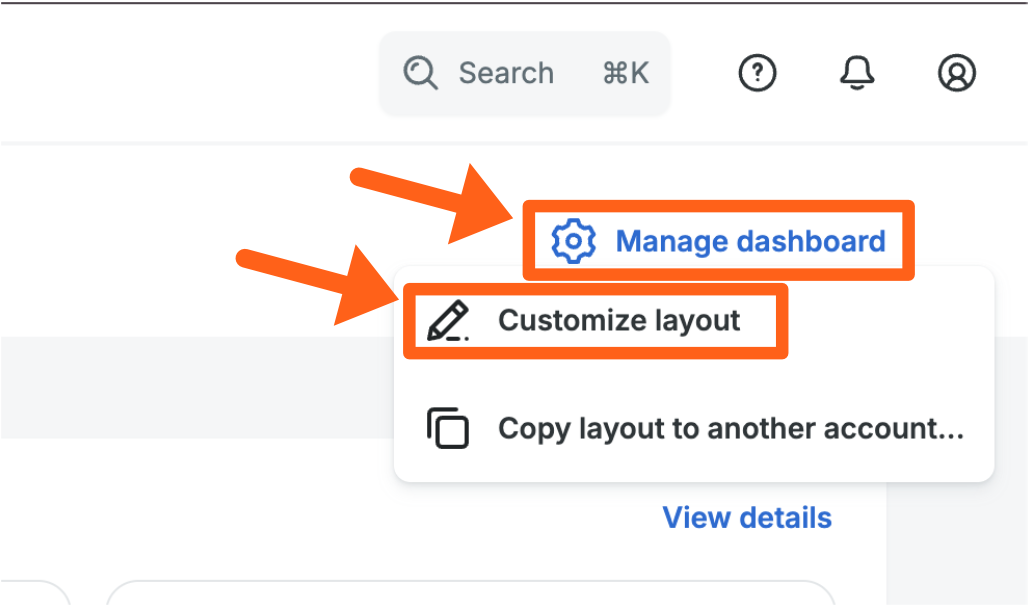
- In the customize view you can:
- Drag the dashboard widgets into any order.
- Resize a widget to be either one column wide or two columns wide by dragging the resize handle in the bottom corners in or out.
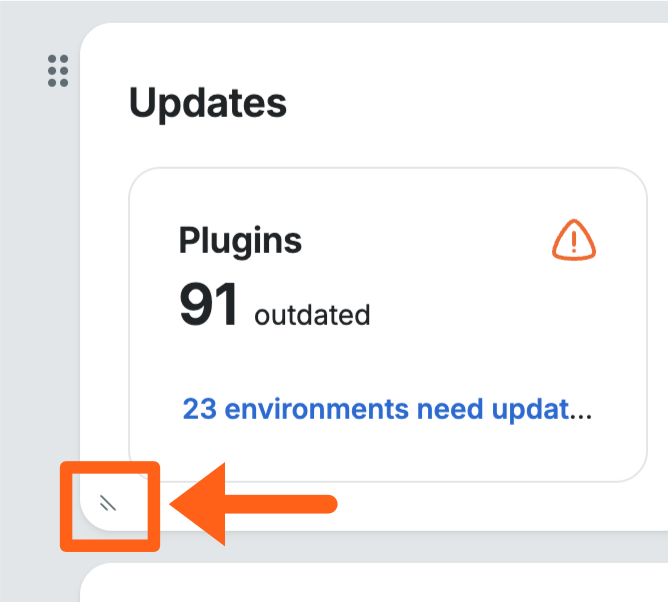
- Add a widget by clicking the Add widget button in the top right. In the Add a widget drawer, hover on any of the widgets and click the Add button or simply drag the widget onto your dashboard.
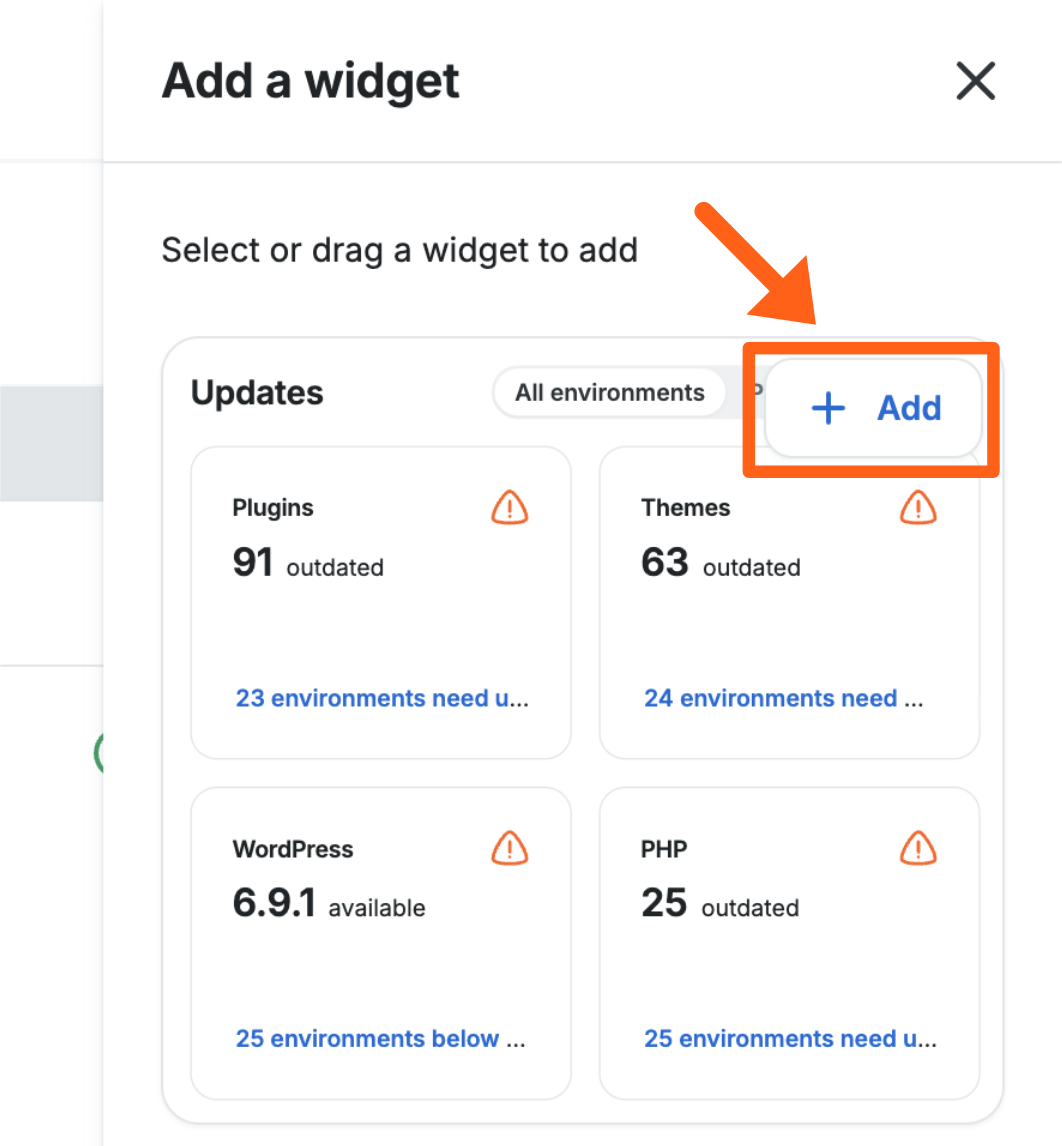
- Remove a widget by clicking the X icon in the top right of the widget.
- Reset the dashboard back to default by clicking the Reset to default button in the top left.

Copy the Dashboard Layout
In addition to customizing the dashboard, you can also copy your customizations to another one of your accounts if you are a Full or Owner level user on the account.
To copy a dashboard layout to another account:
- Go to the Dashboard page and use the account switcher at the top of the left sidebar to select the account that you want to copy.
- Click the Manage dashboard button in the top right.
- Click the Copy layout to another account button.
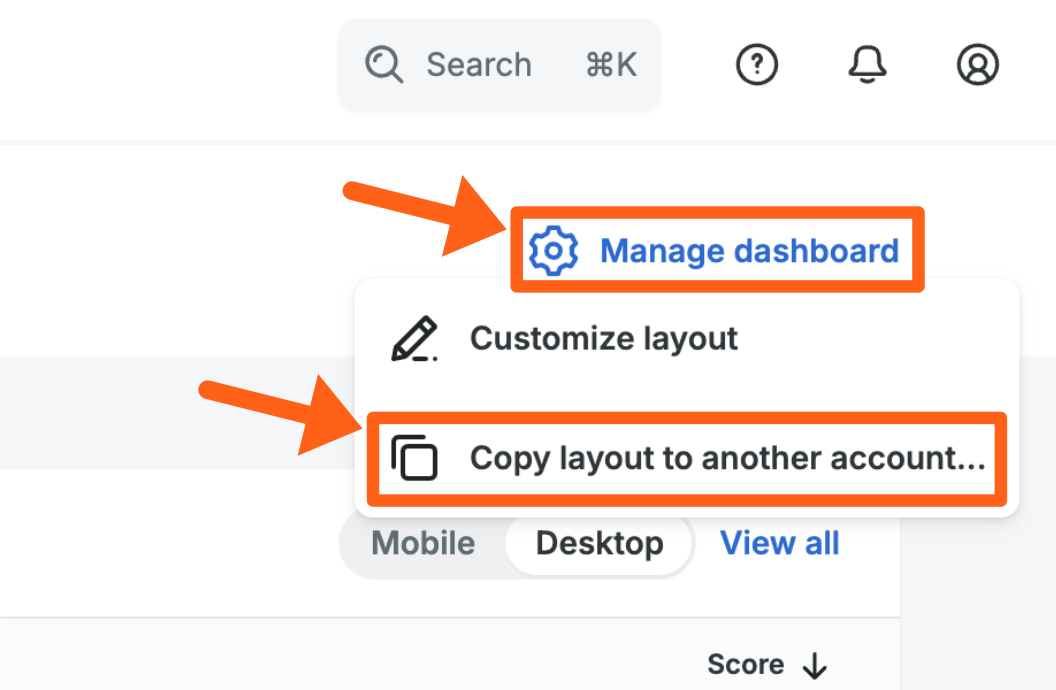
- Select the account(s) that you want to copy the layout to, and then click the Copy layout button.
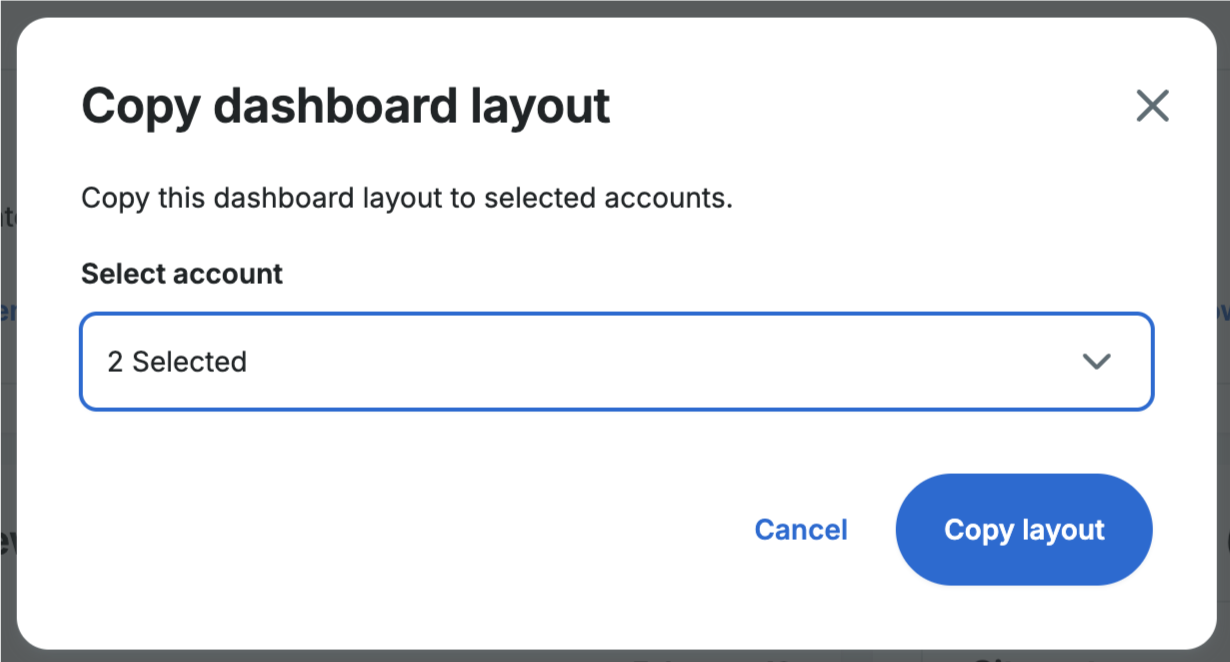
Sites
The Sites page is the central hub for managing your sites on WP Engine. This page offers site and environment management tools, such as details about the environment’s status and the ability to make updates to certain assets, like plugins or themes. Additionally, certain accounts also have the ability to perform these actions in bulk across multiple sites at once.
The Sites page can be accessed by clicking Sites in the main menu of the User Portal, or at the following link: https://my.wpengine.com/sites
NOTE
The Sites page contains an extensive list of features. For more information on the individual features and tools available on this page, see the full My Sites Page article here.
Headless Platform
The Headless WordPress page allows you to manage your headless WordPress applications through the WP Engine Headless Platform.
If you do not have an account with the WP Engine Headless Platform, you will not see this tab.
To lean more about the WP Engine Headless Platform, see our guide.
eCommerce
This eCommerce page allows access to the features of the eCommerce Solution plans.
This page can be found directly at: https://my.wpengine.com/ecommerce_solution
To learn more about these features, see our eCommerce Solution Overview article.
Product Extensions
The Products page provides access to manage product extension settings and to purchase additional product extensions. View the Products page in the User Portal main menu. The Products page can also be found directly at: https://my.wpengine.com/products
- Headless WordPress Search — A search solution tailor-made for headless WordPress. This product extension gives you better speed and greater functionality than your default WordPress search. Learn more here.
- Core Web Vitals — This free feature collects Core Web Vitals (CWV) data on your site so you can see how your site is performing for real traffic.
- Global Edge Security — GES takes Cloudflare’s world-class edge security and performance features and tailors them specifically for WordPress – a managed WAF with WordPress-rules, DDoS protection, and automatic image and traffic optimization. Learn more here.
- Genesis Blocks — Modernize and accelerate the way you create content with tools that enhance the modern block editor. Learn more.
- Genesis Custom Blocks — Easily build custom blocks that look and function exactly the way you want. Learn more.
- Instant Store Search — Increase conversions up to 18% with 10x faster search, autocomplete, “did you mean”, weighted custom results, and AI-powered related suggestions. Learn more here.
- Page Speed Boost — 30+ optimizations powered by NitroPack OneClick designed to improve Core Web Vitals and unlock your best page speed score. No technical expertise required. Learn more.
- Site Monitoring — Your downtime alarm. New code or plugins can cause downtime that goes unnoticed. Site Monitoring instantly alerts you via email or Slack if a site goes down. Learn more here.
- Slack — Personalize your notifications and receive timely updates on the topics that are important to you via Slack.
- Smart Plugin Manager — Save time, boost security. A majority of hacks on WordPress come through out-of-date plugins and themes! SPM auto-updates your plugins and themes safely with auto-rollback.. Learn more here.
Users
The Users page allows management of hosting account users. For more on users see the Users guide here.
- Account users — Invite users to this hosting account and manage their permissions. Learn more about users here. Note, new accounts will likely not be able to add new users for around 15 minutes after account creation.
- Technical contacts — This information will be contacted about WordPress updates, security notifications, and other technical concerns. This contact is not necessarily an existing account user, for example you may choose to use a distro (distributed) email here instead to notify multiple people at once. Read more about Technical Contacts. This page can be found directly at: https://my.wpengine.com/technical_contacts
- Account activity — Information regarding changes that have occurred in the User Portal, what changes were made and by which user. Display and filter options can be accessed by clicking the three dot menu icon to the right of a column name. To download the log, click the CSV icon at the top right.
- API access — Enable API access generate API credentials. Learn more about API access here. This page can be found directly at: https://my.wpengine.com/profile/api_access
- Single Sign-on — Configure SSO identity management for users on your plan. Learn more about Single Sign-on here. This page can be found directly at: https://my.wpengine.com/profile/single_sign_on
- Seamless Login — Allow users on your account to log in to WordPress with one click from the WP Engine User Portal. Lean more about Seamless Login. This page can be found directly at: https://my.wpengine.com/profile/seamless_login
Billing
The Billing section shows plan details and billing-related plan information.
Only users granted Owner or Billing level access to this plan can view Billing pages.
- Invoice — Locate invoices, plan renewal date and other pertinent WP Engine plan information. Read more about the Invoice page.
- This page can be accessed directly at: https://my.wpengine.com/my_account
- Usage — See your plan usage summary. Read more about this page here.
- This page can be accessed directly at: https://my.wpengine.com/usage
- Modify Plan — Change your plan type or purchase product extensions for your plan. Learn how to change your plan.
- This page can be accessed directly at: https://my.wpengine.com/modify_plan
Account Settings
The account settings page shows options that affect the entire account.
To view the account settings page for an account:
- Use the account switcher at the top of the left sidebar in the User Portal to select the account that you want to edit.
- Click Settings in the sidebar.

The options that show on the account settings page are:
- Account name: This option lets you add an account nickname that will be displayed in the User Portal. This is a cosmetic change only. This can only be updated by Owner level users for an account. Does not impact invoices and billing will not be changed.
- Default WordPress update source: This option lets you choose your preferred update source for WordPress core software, and for free WordPress plugins and themes.
Read more about update source options. - Allow site transfers via transfer code: This option lets you temporarily enable site transfers into your account from another WP Engine account. You can disable this option again after you’ve received an expected site transfer.
Read more about site transfers.
Additional Menu Items
Support Pin — Located in the bottom left corner, or within the Get Help menu at the top right. The Support PIN is required for security purposes when contacting Support for assistance. Learn more about your Support PIN and why we use it. Use the arrow icon to generate a new PIN.
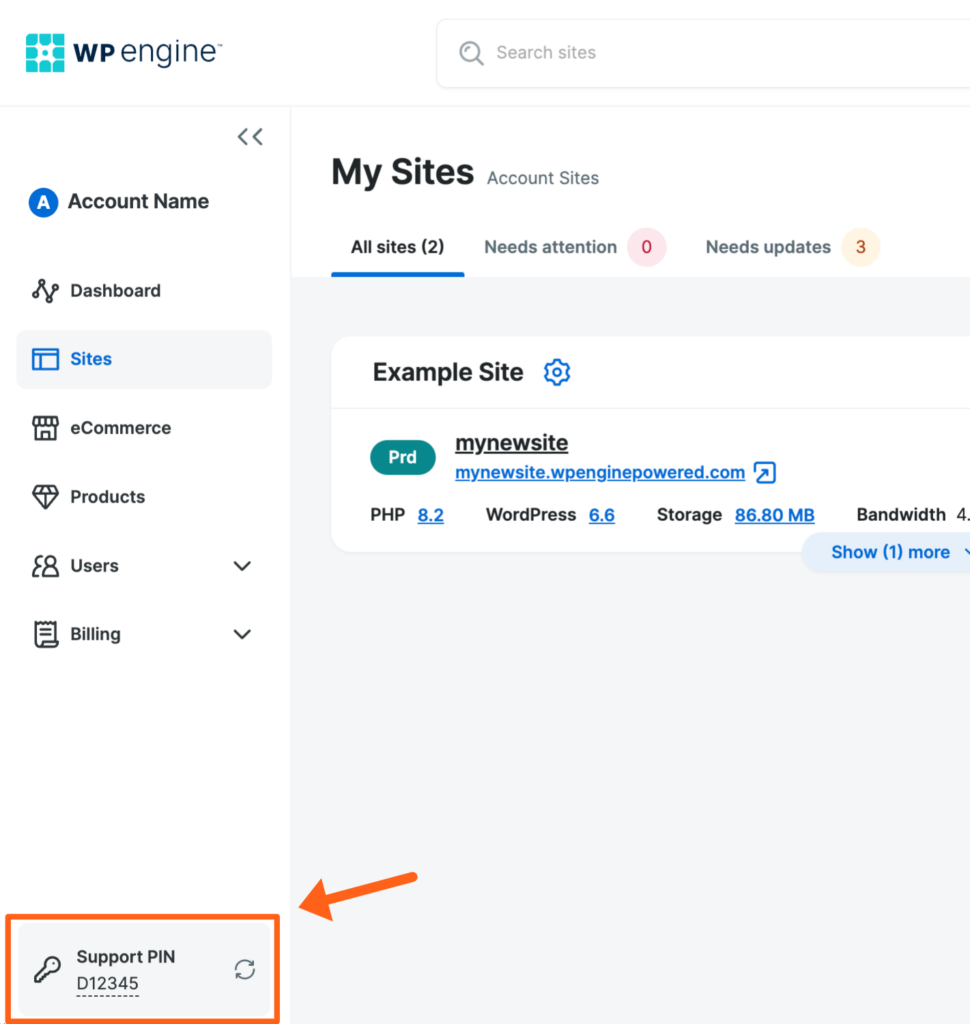
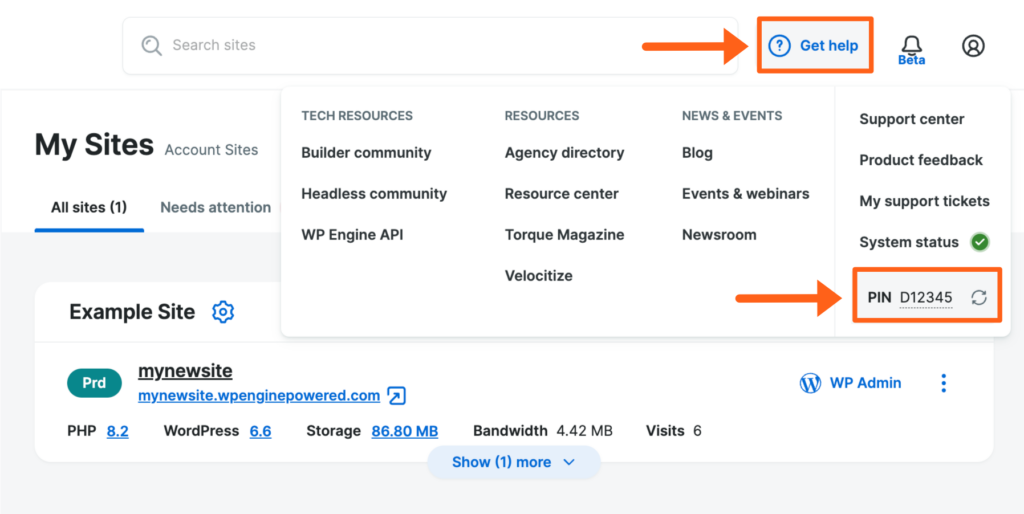
If you’re on a mobile device you can click the question mark button in the top right to see your pin.
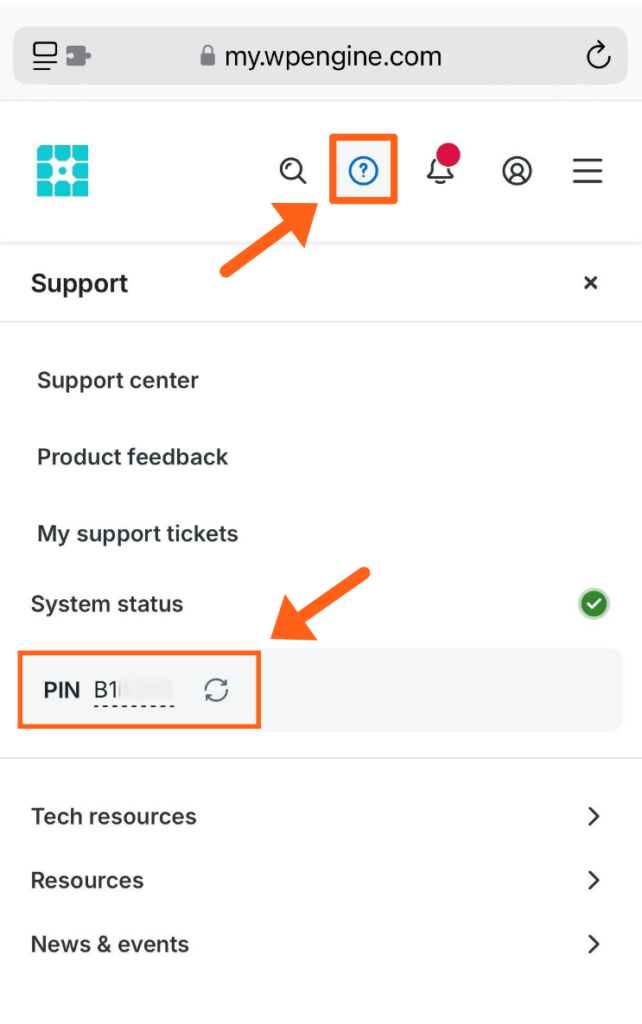
Live Chat — Located in the bottom right corner, connects you to our Support team via chat. Support is available to help 24×7, including weekends and holidays. Learn all about WP Engine Support.
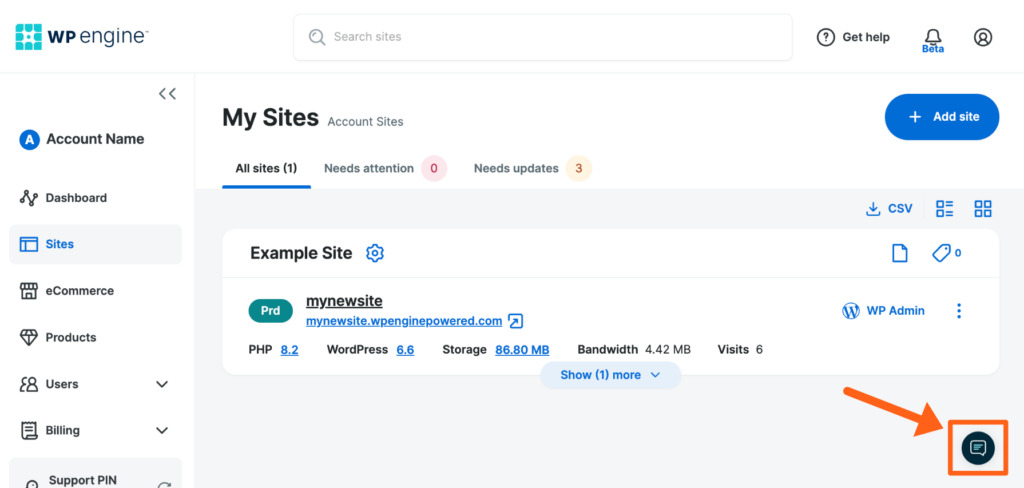
Support — Located in the top right corner, search the Support Center article database, view open tickets or contact award-winning Support directly. Learn all about WP Engine Support.
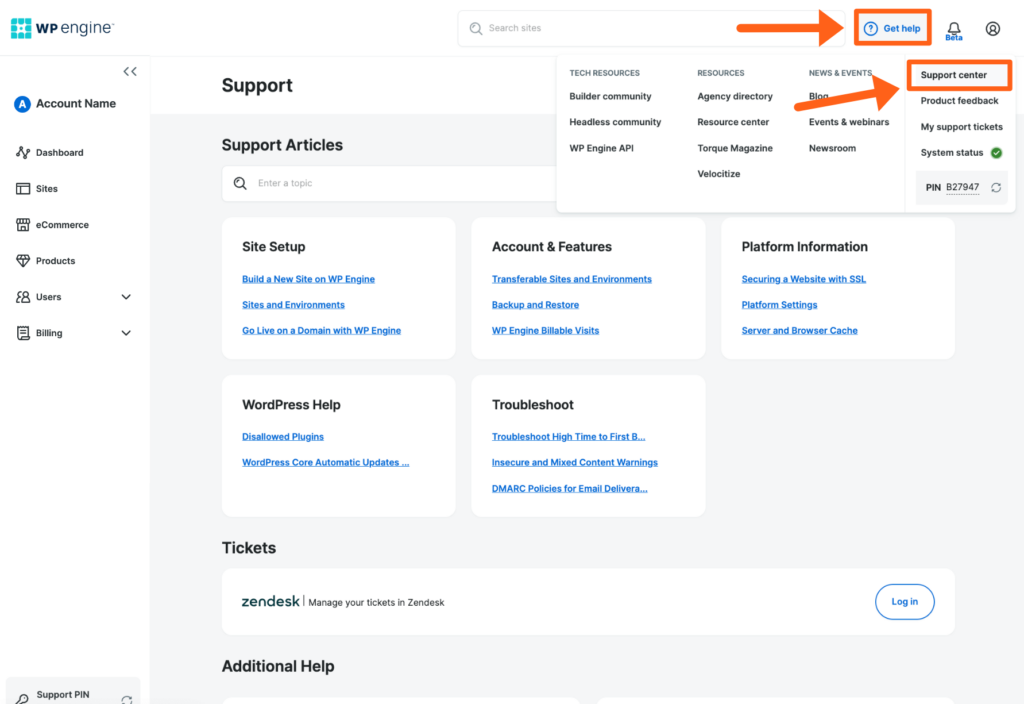
To provide Product feedback, expand the Get Help menu at the top, then select Product feedback.

My Account — Located in the top right corner, this menu allows you to manage your user account as well as account-wide management features.
- Profile & Settings — Manage your personal account details for WP Engine.
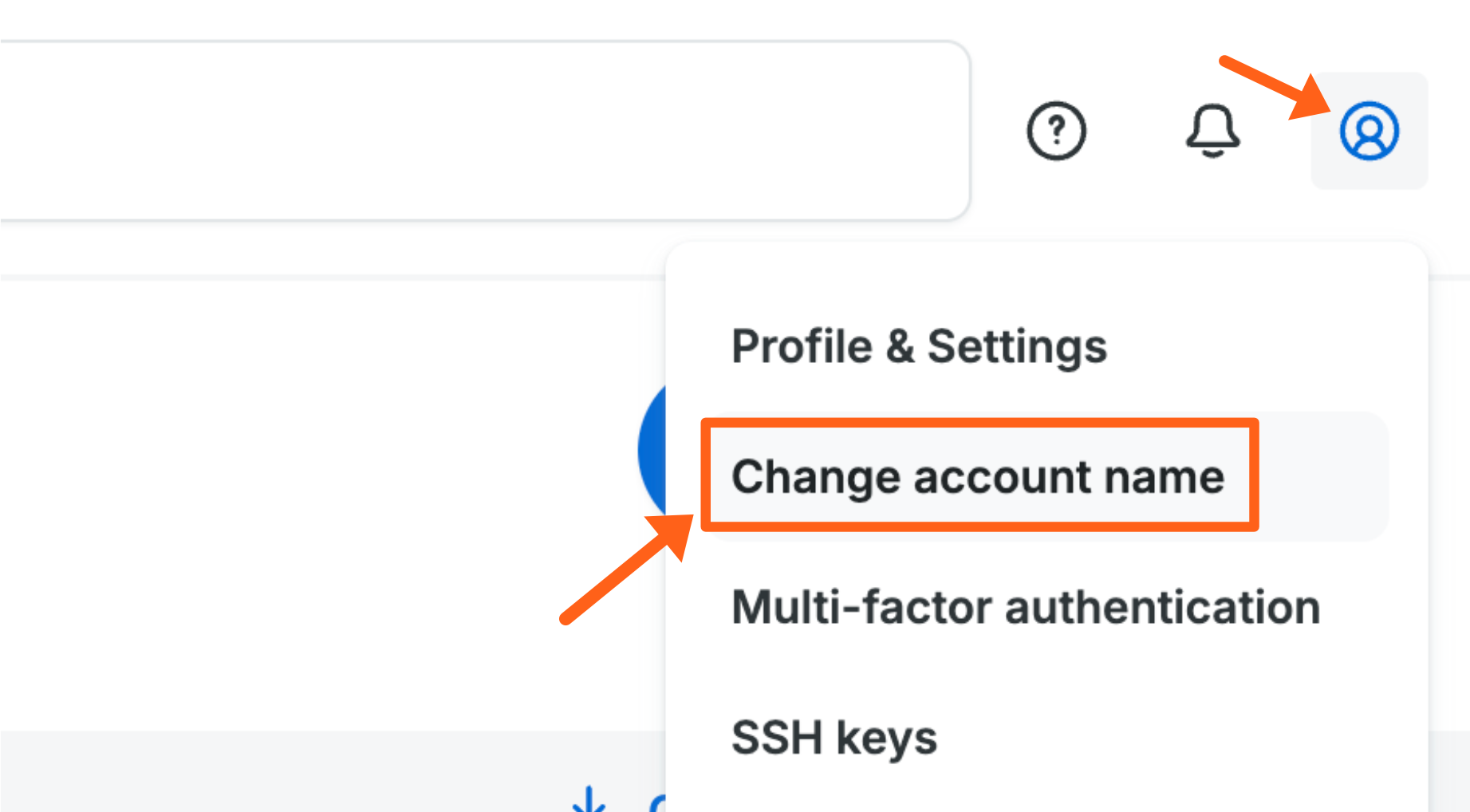
- Multi-factor authentication — Configure MFA when logging in to the WP Engine User Portal, such as two-factor verification through Google Authenticator.
- SSH keys — Add SSH keys for use with the SSH Gateway, or services like Local.
- GitHub Action — Use GitHub Actions to easily create an automated deployment process from GitHub to WP Engine.
- Bitbucket Pipeline — Configure Bitbucket Pipelines to deploy code from your local machine
- Sign out — Click to log out of the User Portal on the current device.

Omnisearch
Omnisearch is the search bar in the top right of the WP Engine User Portal that allows you to search for all sites and accounts that you have access to as a user.
You’ll also find your recent searches here before you start typing your search phrase.
When you search, the results will be grouped by accounts first, and then sites.
- Accounts: Accounts will show at the top with the Account label next to them as shown below.

- Sites: A site can show in the results if the site name, or any of its environment names or domain names match the search phrase. Within each site returned you will see the site name and the site’s matching environments grouped below it. If the site name itself matches then all of the site’s environments will show. Any domain names that match the search phrase will also be shown below each environment.
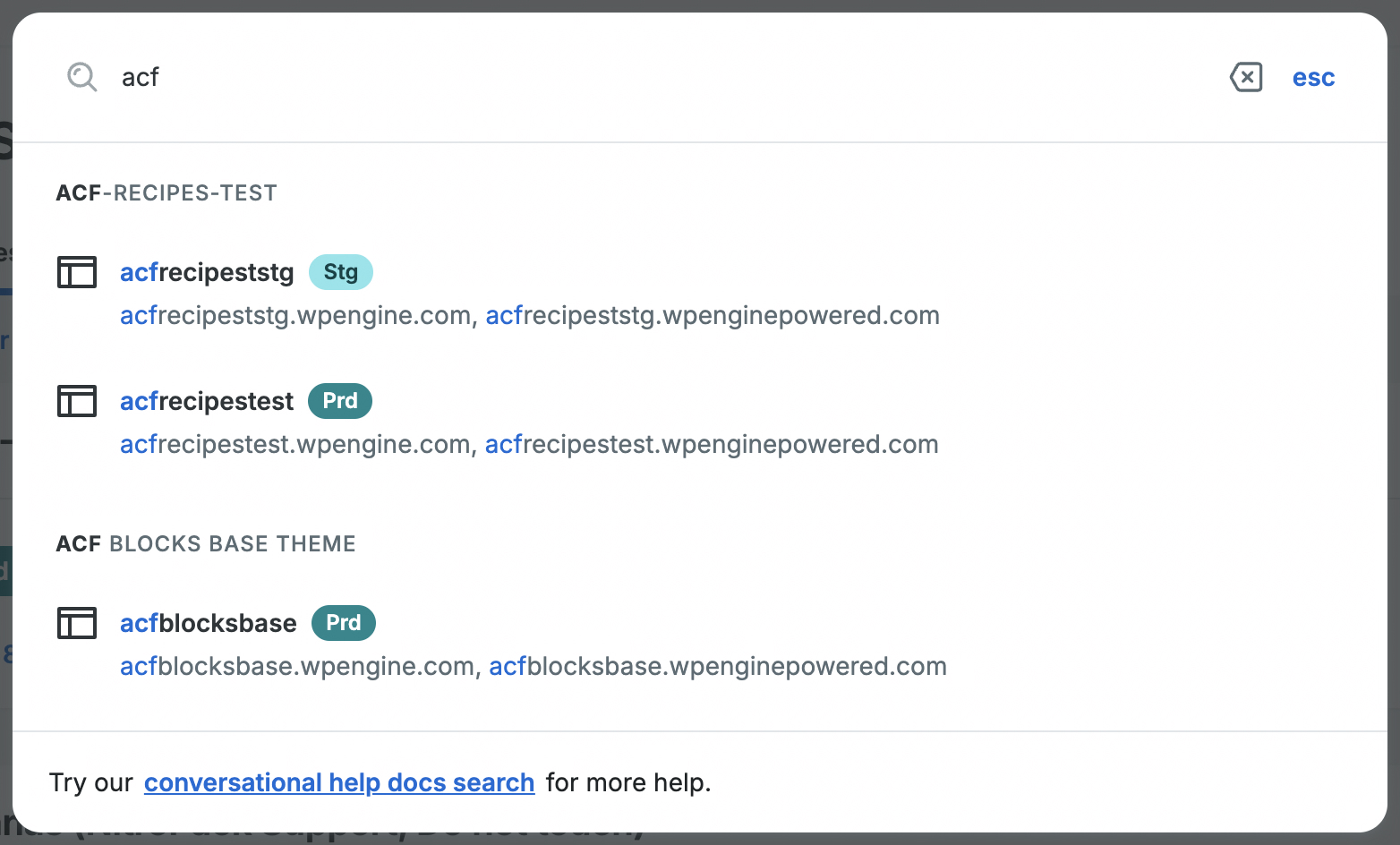
Omnisearch Quick Actions
The search results in the Omnisearch window now have quick actions next to each environment. The quick actions also show in the recent searches section before you type a search phrase.
The quick actions for an environment include:
- Create a backup
- Clear all caches
- Open WordPress dashboard

Environment Overview Page
The Overview page is specific to each environment and can be used to view an environment at a glance. Data and settings on this page impact only the environment name selected.
Access the Overview Page
You can access the overview page for any environment from the Sites page. Click the Site name to view its environments. This will take you to the overview page for the Production environment of the site.
From the nav bar pictured below, you can select any of the 3 environments for a site (Production, Staging, or Development) to view a separate overview for each environment.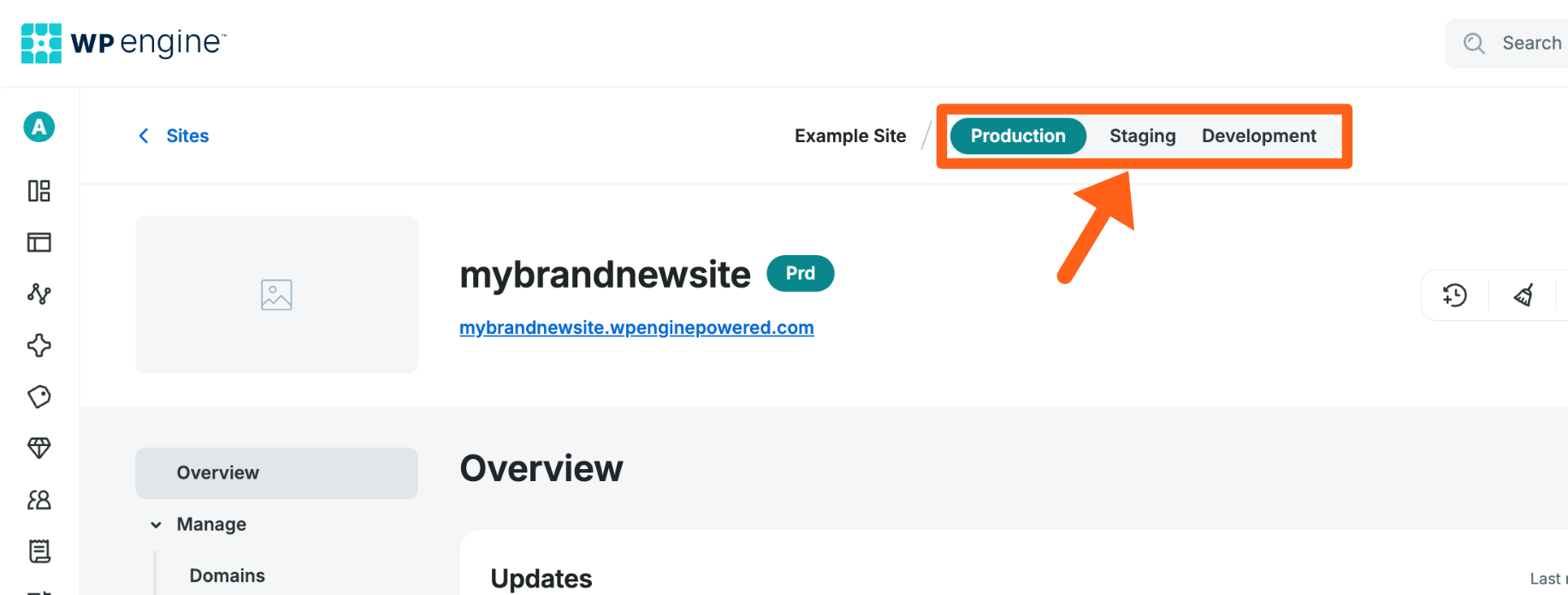
If you know the unique name of the environment already, the Overview page can be accessed directly at: https://my.wpengine.com/installs/[yourenvironmentname]
Overview Page Header
At the top of the Overview page, the Site name is listed along with links to all the environments that currently exist in the Site. You can click the Add environment button to add a new environment as needed.
Below the Site name and environments are some additional options for managing your website (as described and numbered in the image below):
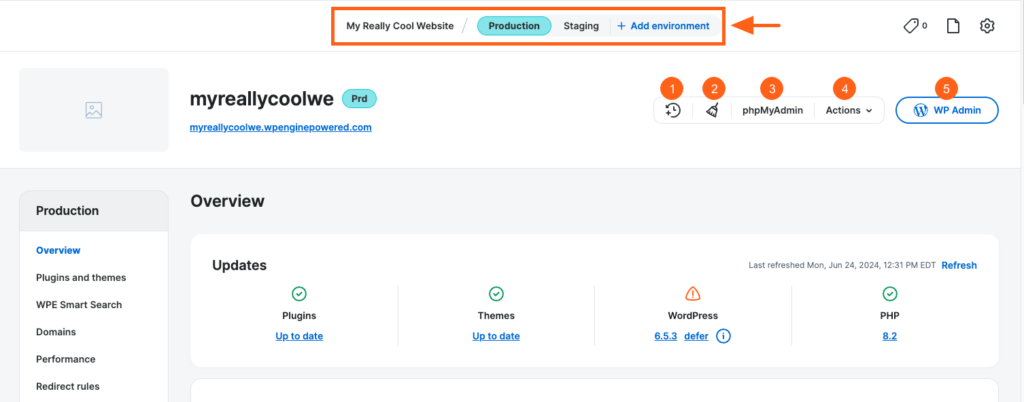
- Create a backup — Create a new backup checkpoint. Read more.
- Clear all caches — Purge this website’s page, object, and network caches.
- phpMyAdmin – Access and work with your database.
- Actions menu – Click to reveal several options:
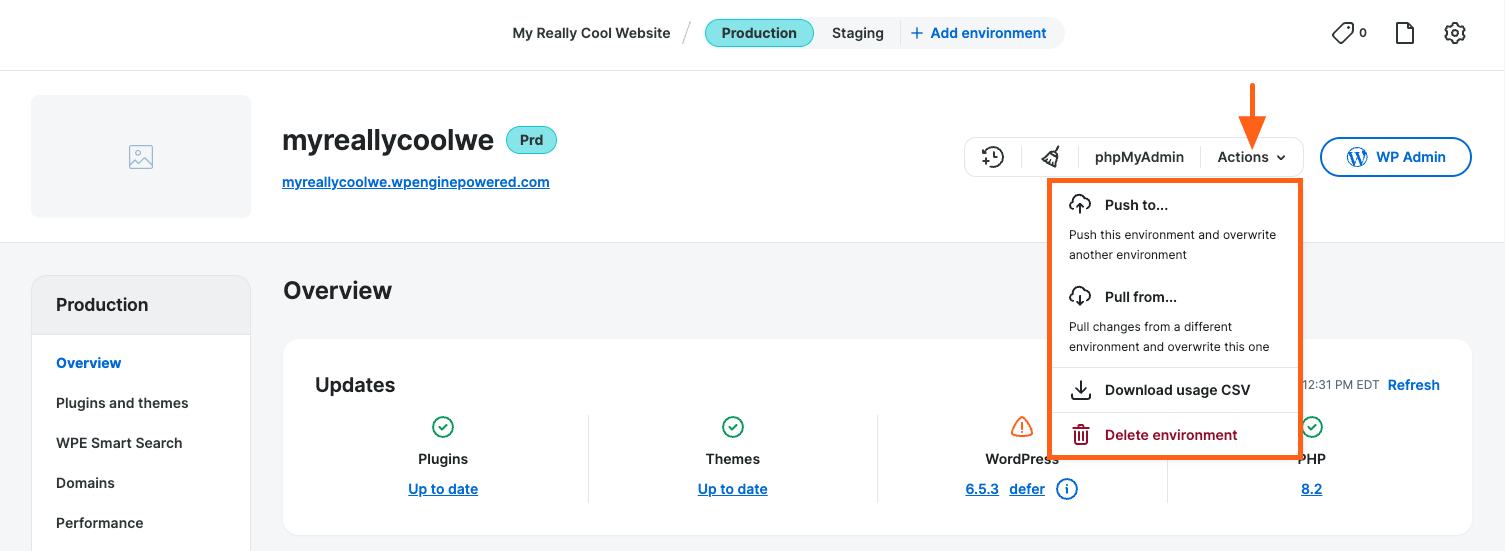
- Push to and Pull from — These buttons allow you to copy content between environments. You can move data to and from any environment in your account. For example, if you’ve developed content in your development environment, you can push that content up to production when you’re finished. See our article, Copy an Environment Using Push or Pull, for more information.
- Download usage CSV — Downloads a CSV listing daily usage stats for objects served, data served via CDN, server processing hours, and dynamic hits to the server.
- Delete environment — Delete the current environment you are viewing. Confirmation will display before removal begins. This does not impact any other environments within the Site.
- WP Admin – Access your WordPress dashboard.
Overview Page Content
The following information is available on the Overview page (described below the image):
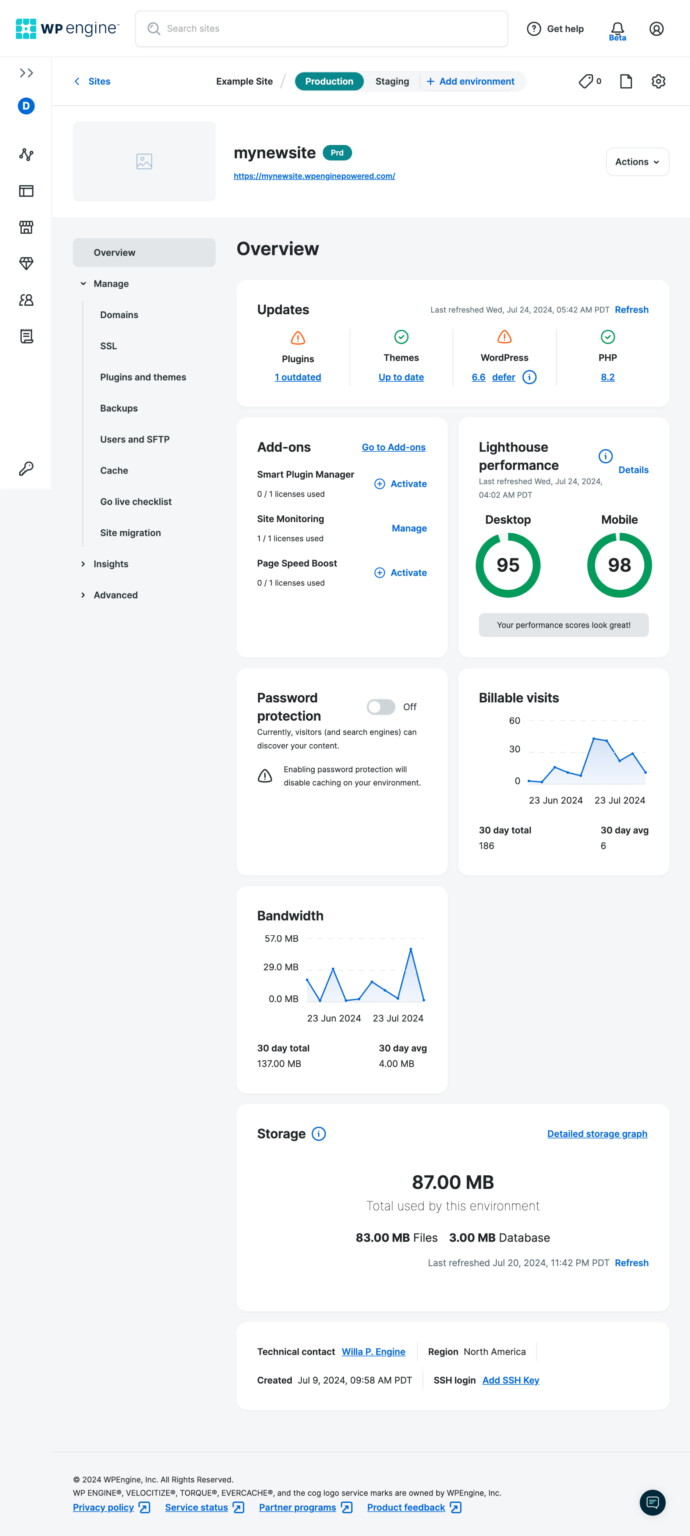
Updates
This section shows any detected plugin, theme, WordPress, or PHP updates available to this environment. Click Refresh in the top right corner of this section to fetch a more current status.
Extensions
This card lets you manage product extensions on your account with options to learn more, activate, purchase more licenses, or go to the settings page for an extension.
Learn more about product extension management.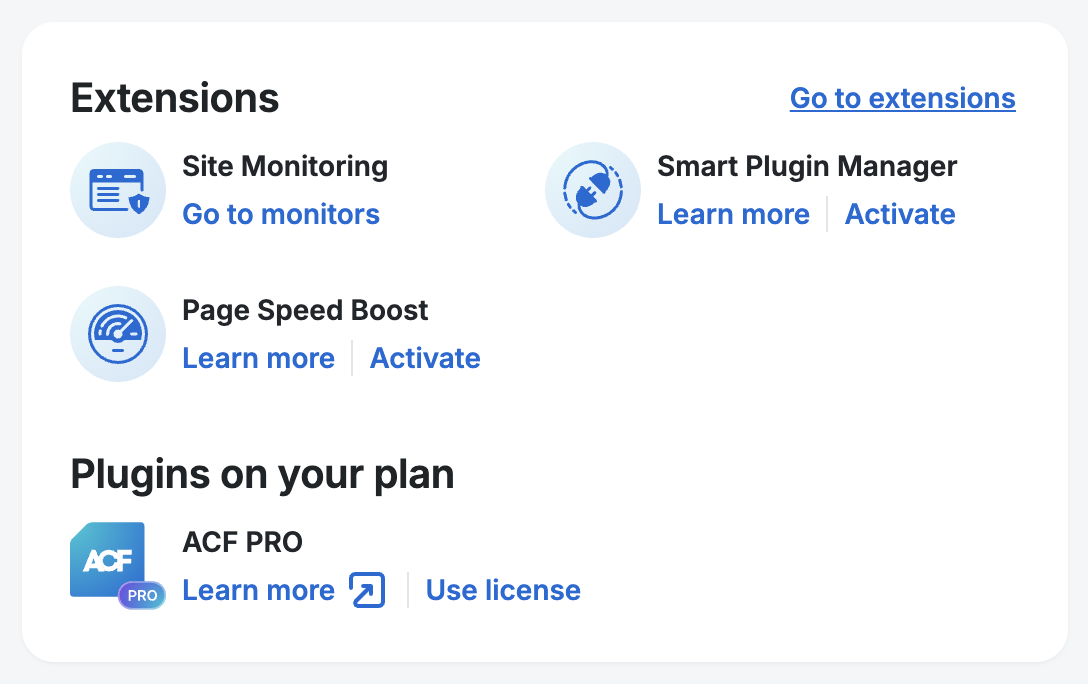
Plugins on your plan – This section lets you manage and install paid plugins associated with your WP Engine account right from the Extensions card in the Overview section for an environment. The example in the screenshot shows the option to add your WP Engine license for ACF Pro to the current environment.
Note
The plugins feature of the extensions card is currently only available for agency accounts.
Lighthouse Performance
Measures website performance utilizing Google Lighthouse. Only works on Production environments that are publicly accessible at a live, custom domain.
Password Protection
If you want to hide the currently selected environment from public view, you can enable password protection here.
Visits
The usage card on an environment’s overview page shows usage stats for the last 30 days. The visits stats now display billable visits and total visits side-by-side. You can also select the Visits tab of the usage graph as pictured below, and see billable visits and total visits plotted out together on the graph.
Bandwidth
Recent bandwidth usage by the selected environment for the current time period. Learn how to reduce bandwidth.
Storage
Total storage used by the current environment. Click Refresh in the bottom right corner of this section to fetch a more current status. Learn how to reduce storage here.
Technical Contact
Point of contact for WP Engine should there be an issue with the selected environment. Learn more about technical contacts.
Region
Geographic region where the current environment’s server is located. Learn more about data center regions here.
Created
The environment’s creation date and time.
SSH Login
SSH address used when connecting to SSH Gateway. Learn more about SSH Gateway.
This is the navigation menu located on your Site Overview page, to the right of the Main Navigation menu. Any changes to items with this secondary menu will impact only the environment name that is displayed at the top of the page.

- Plugins and Themes — View status and version info for plugins and themes installed on an environment. Additionally, accounts with access to Bulk Updates can access update features. Read more below.
- Domains — Shows all domains added to an environment. Read More.
- Redirect rules — Add or remove 301 and 302 redirect rules. Read more.
- Backup — Create, restore, or download backup checkpoints. Read more.
- Logs — View Access and Error logs for an environment.
- Users and SFTP — Manage users for accessing the website and its filesystem. Read more about SFTP or read more about account users.
- GitPush — Add and manage git developers that have access to your install. Read more.
- SSL — Add SSL certificates to your domains. Read more.
- Utilities — Enable/disable Password Protection, reset file permissions, and enable/disable Multisite.
- Cache — Purge your website’s page and network caches, enable/disable Object Cache, and view any non-default cache exclusions.
- Site migration — Shows steps for migrating with our Automated Migration plugin and generates SFTP credentials for use with the plugin. Also offers a manual migration checklist.
- Go Live Checklist — Your quick reference for mandatory and recommended steps when taking a website live. Read more.
- Web rules — Direct traffic based on custom rules, such as blocking an IP range or redirecting traffic based on header. Read more.
Plugins and Themes
The Plugins and themes page allows you to see status and version info about the plugins and themes installed on an environment.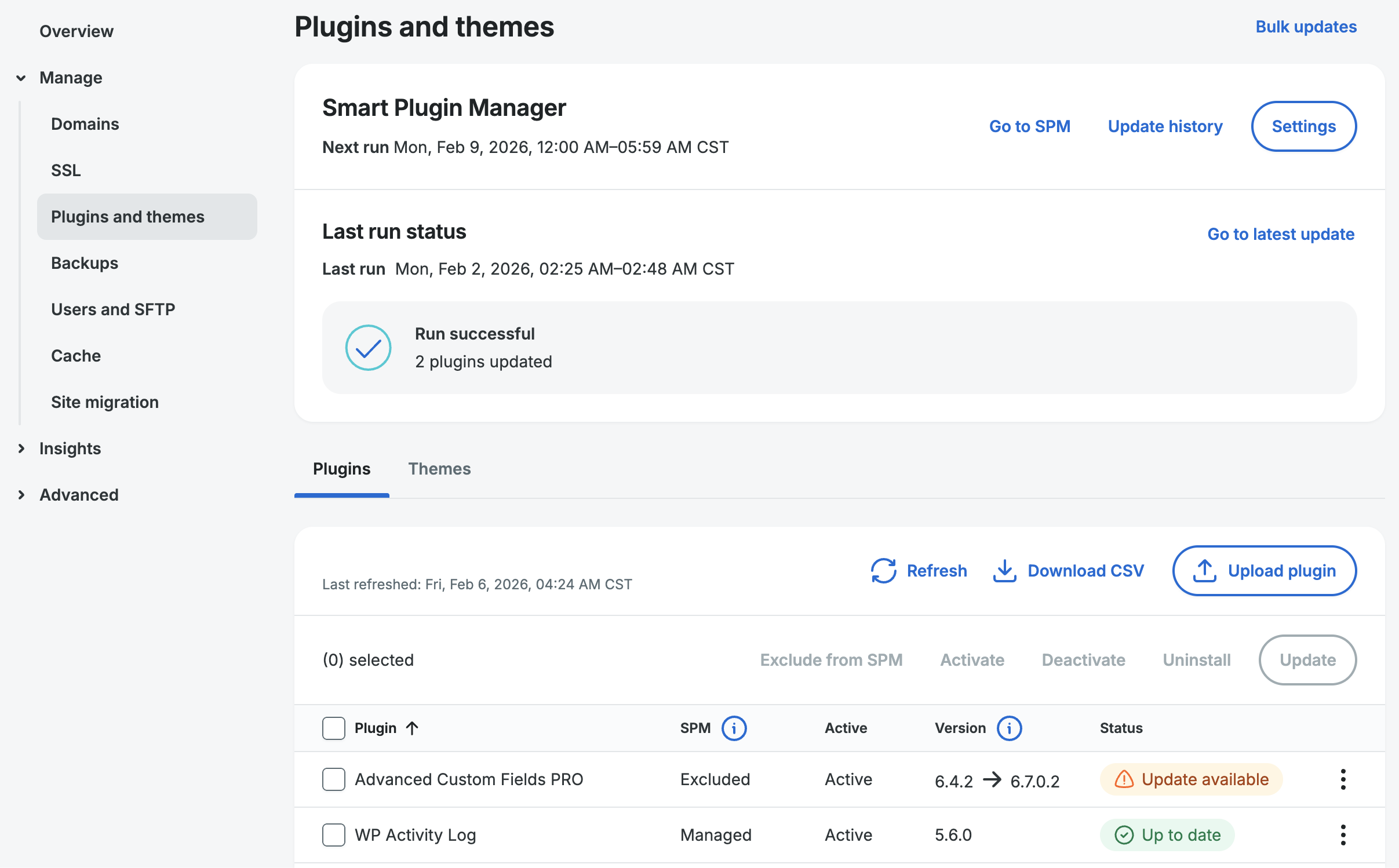
Data update frequency
We check twice daily for updated plugin and theme versions. We now also update the versions immediately when you update themes or plugins in WordPress. It may take several minutes after updating to see your updated version here.
For accounts with access to Bulk Updates, there are also update features including new Add plugin and Add theme buttons.
Note
The bulk updates feature is only available on Flywheel Growth Suite, Agency Client Hosting, Premium Agency, and Premier plans. The feature is not yet available to WP Engine Shared, Flywheel, AWS, or WP Engine Headless Platform plans.
Plugin and Theme Upload for an Environment
The new Add plugin and Add theme buttons allow a plugin or theme to be uploaded directly from the User Portal. In addition to adding new plugins and themes this feature can also be used to update existing plugins and themes with uploaded zip files.
- From The Plugins and themes page for an environment select the Plugins or Themes tab near the top of the page depending on which type you want to upload.
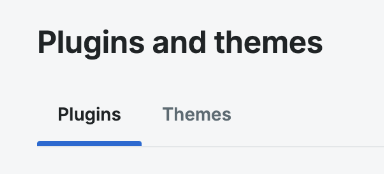
- Click the Add plugin or Add theme button

- Choose from 3 options to upload your plugin or theme
- Search for the plugin/theme in the repository
- Paste in a link to a zip file
- Upload a zip file from your computer
- There is also a checkbox option to activate the plugin after it is installed
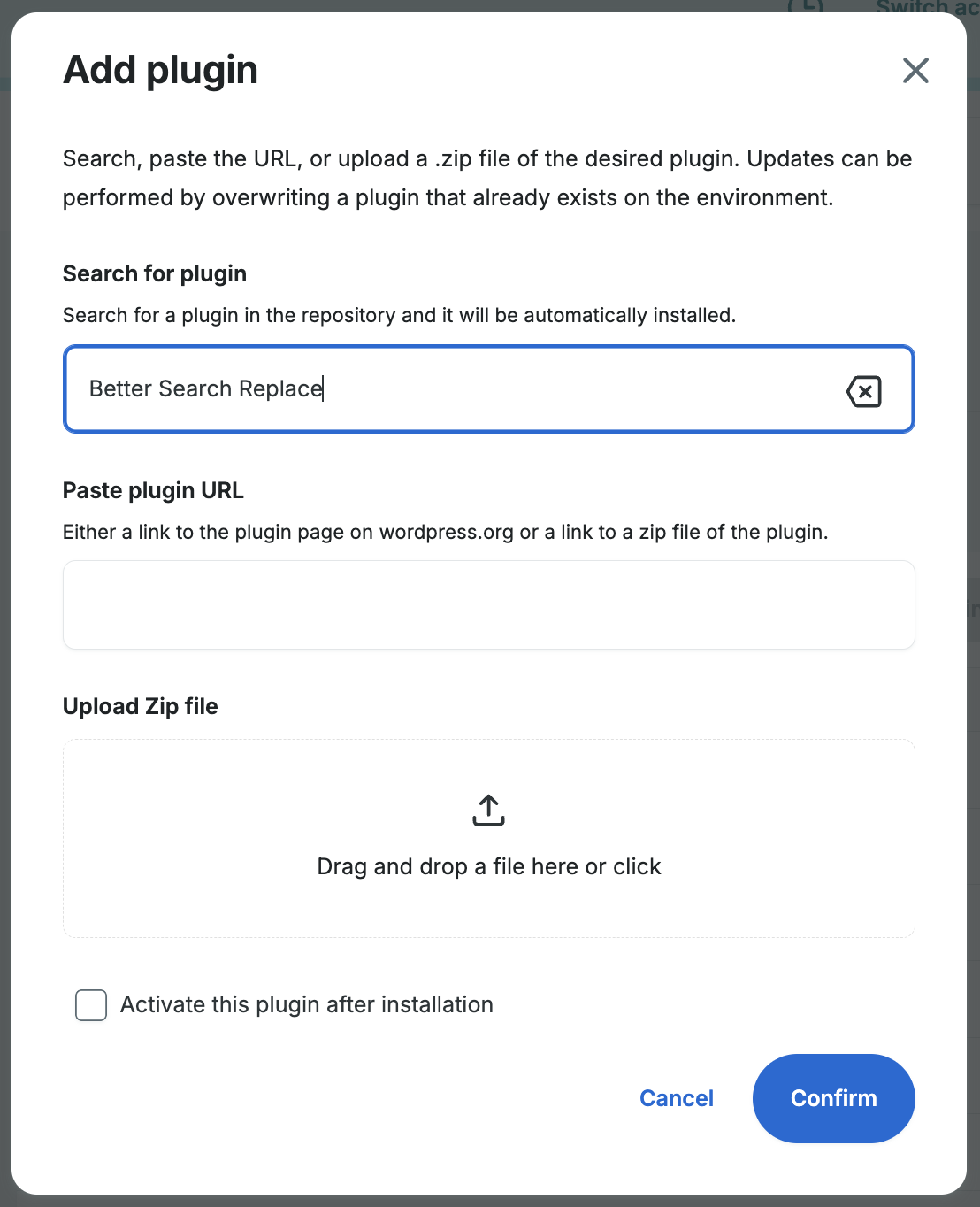
- Click Confirm to upload the plugin or theme
All Accounts View
The All accounts view allows you to see information about all of the sites that you have access to, across all of your accounts. All users can see a list of their sites in the All accounts view. Users with Full or Owner level access to more than one Premium account (Core and Enterprise), can also see aggregated usage and performance data across all of your premium accounts.
To select the All accounts view:
- Click the currently selected account name at the top of the left sidebar.
- Select the All accounts option, directly under the search bar.
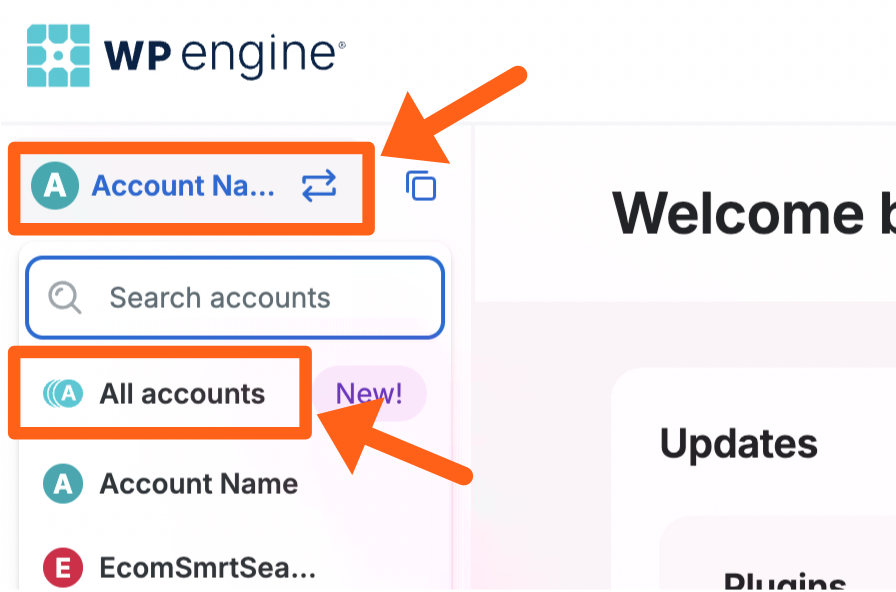
All Accounts Sites Page
The All accounts version of the Sites page has the same functionality as the single account Sites page, while seeing all of the sites that you have access to across all accounts. You can access it by clicking on the Sites link in the left sidebar of the All accounts view.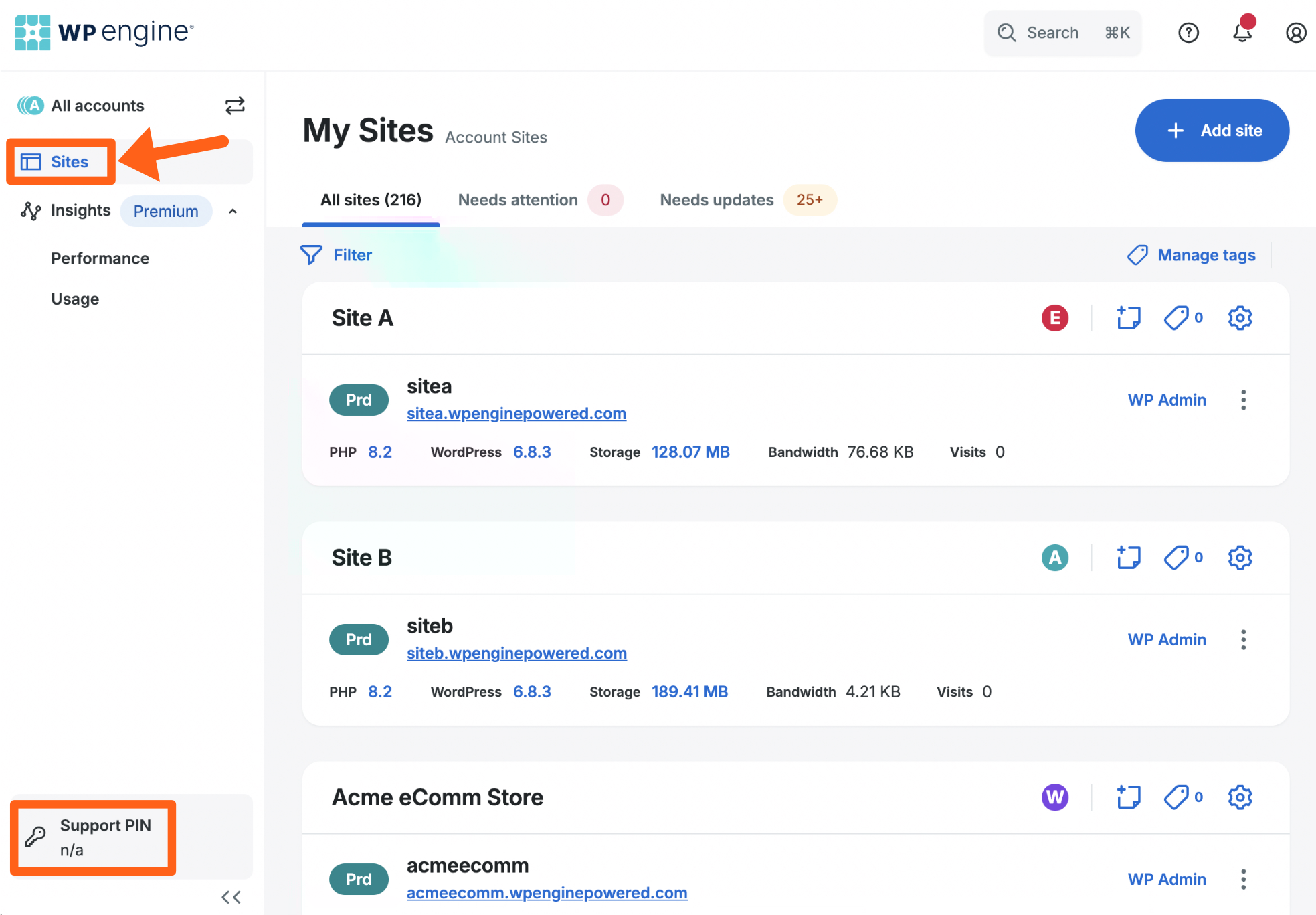
Note
You’ll also notice, as shown above, that your support pin will be blank in the All accounts view, because you have a separate support pin for each account. To see a support pin, you must select a single account from the account switcher at the top of the left sidebar.
All Accounts Usage Page
To get to the All accounts Usage page, open the Insights dropdown from the sidebar in the All accounts view, and select Usage. This page will only be available if you are a Full or Owner level user on more than one premium account.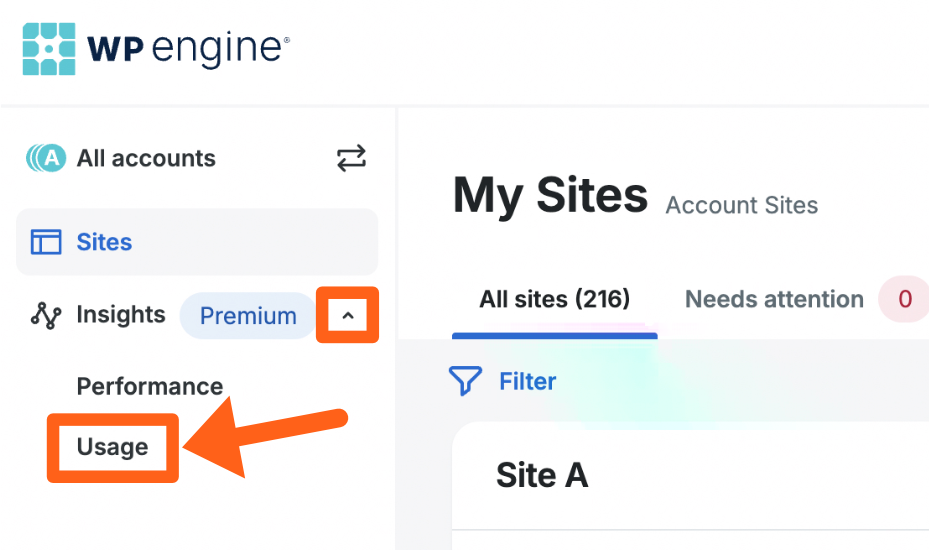
The Usage page shows Usage by environment and Usage by account, for the last 30 days. The usage stats include storage, bandwidth, billable visits, and total visits.
All Accounts Performance Page
To get to the All accounts Performance page, open the Insights dropdown from the sidebar in the All accounts view, and select Performance. This page will only be available if you are a Full or Owner level user on more than one premium account.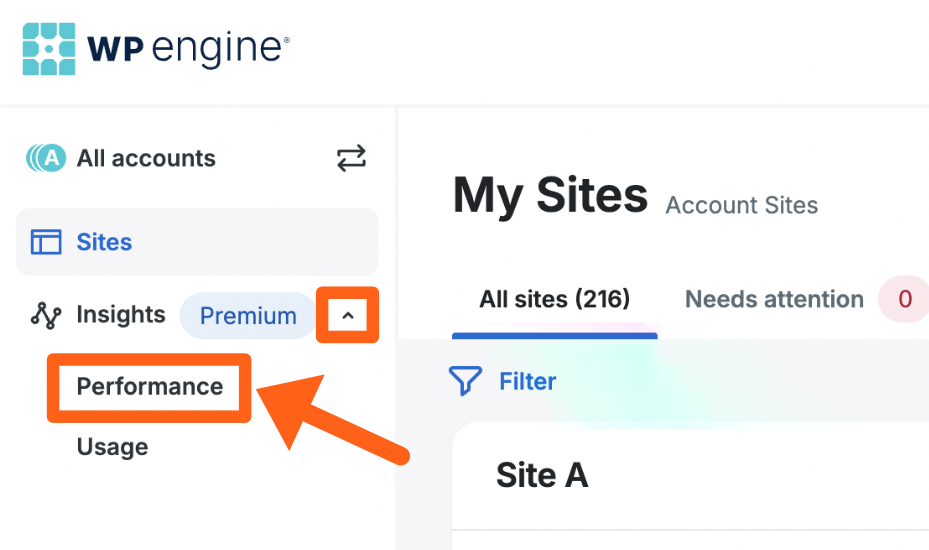
Note
Accounts on AWS servers will not show PHP and MySQL data. They will be omitted from those tables.
The performance page shows website errors in the 5xx range (e.g. 500, 502, 504) by environment for the last 30 days. It also shows 3 different categories of performance data by account for the last 30 days, including 5xx errors, PHP (CPU and memory usage), and MySQL (CPU usage).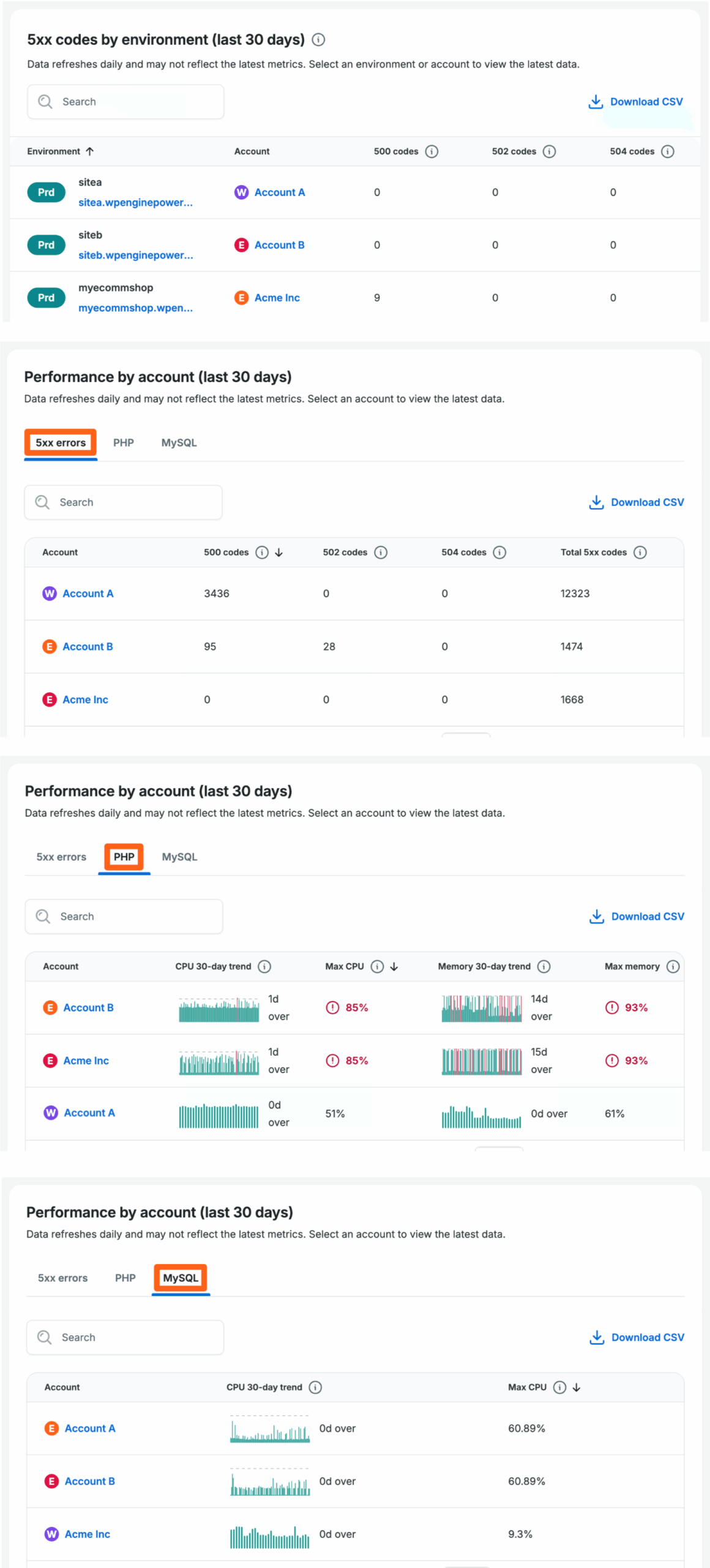
NEXT STEP: Learn how to recover your User Portal login
